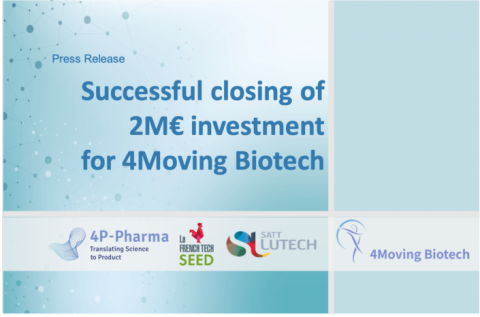
4Moving Biotech announces a closing of €2M investment to implement 4P004 phase 1 clinical trial on Osteoarthritis patients
4Moving Biotech, a French biotech start-up company, announces that it has closed a €2M investment agreement with 4P-Pharma, SATT Lutech, French Tech Seed and business angels. 4Moving Biotech is an asset centric company focusing on the development of 4P004, a first-in-class Disease Modifying OsteoArthritis Drug (DMOAD). 4Moving Biotech intends to use the proceeds to initiate a phase I clinical trial on people suffering from osteoarthritis.
-
Roselina Lam, Business Development and Licensing Manager
A closing of €2M
4Moving Biotech announces that it has closed a €2M investment agreement with 4P-Pharma, SATT Lutech, French Tech Seed and business angels. For its first round of funding, 4Moving Biotech benefited from the private investment of 4P-Pharma and SATT Lutech for €1.25M in equity, reinforced by the support of private business angels and French Tech Seed Fund (managed by the French Public Investment Bank, Bpifrance) for €750K in convertible bonds.
Osteoarthritis, an urgent unmet medical need
Osteoarthritis (OA) is a chronic degenerative disease of the joints, it is one of the most common painful diseases and the leading cause of disability among people over 50. Worldwide, over 300 million people are affected, representing 15% of the adult population. Nearly one out of two adults will suffer from knee or hip osteoarthritis in their lifetime. Due to the aging population and rising obesity rate, the disease prevalence is sharply rising.
So far, no disease-modifying OA drugs changing the course of the disease have been approved by US or European medicines agencies, patients rely on poorly effective symptomatic treatments such as analgesics and anti-inflammatory drugs to ease OA-induced pain. In the final stages when the symptoms worsen, invasive total joint replacement surgery becomes inevitable. OA is therefore a pressing unmet need.
In addition, OA imposes a heavy economic burden on patients and health care systems. In 2010, in France, direct medical costs exceeded €3.5Bn, and costs in the US were estimated up to $200Bn annually.
4P004, a promising DMOAD
Since 2015, 4P-Pharma, Prof. Francis Berenbaum’s Sorbonne University-INSERM laboratory and SATT Lutech have joined their expertise to develop 4P004.
The innovation originates from the laboratory of Prof. Berenbaum and has been selected among 300 scouted technologies by 4P-Pharma. Today, 4P004 is transferred to 4Moving Biotech, an asset centric company and subsidiary of 4P-Pharma, directed by Revital Rattenbach, PhD, MBA, as Chairwoman and Francis Berenbaum as Chief Executive Officer/Chief Medical Officer.
This successful public-private collaboration has demonstrated that this innovation is a promising DMOAD. 4P004 is a GLP1 analog repurposed drug formulated for intra-articular administration. It is characterized by a unique triple effect: anti-inflammatory, analgesic and cartilage regeneration, therefore providing a long-term solution for people suffering from OA.
After a thorough technical value validation with a large array of preclinical model studies, as well as veterinary pilot clinical phase on spontaneous OA in dogs, 4P004 is now ready to move towards human clinical phases on OA patients.
“The incorporation and development of 4Moving Biotech is the proof of the relevancy of 4P-Pharma business model: bringing to patient the best innovations from academic scientists, in a relatively short time and with limited risks”, says Revital Rattenbach, Chairwoman of 4Moving Biotech and 4P-Pharma. “I am delighted to have achieved this first round of financing for 4Moving Biotech thanks to the trust of our investors and partners of several years.”
“This fundraising gives us an extraordinary opportunity to conduct our first clinical trial in women and men suffering from OA with 4P004”, adds Francis Berenbaum, CEO/CMO of 4Moving Biotech, Head of rheumatology department at Saint-Antoine Hospital (AP-HP), and Professor at Sorbonne University (Paris, France). “This opens up a unique opportunity for us to bring to market in the short term the first disease-modifying treatment for osteoarthritis.”
